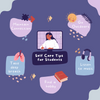
Selfcare For Students
, by Paul Walker, 3 min reading time

, by Paul Walker, 3 min reading time
Being a student can be a whirlwind of assignments, exams, and extracurricular activities, often leaving little time for self-care. Yet, maintaining mental, emotional, and physical health is crucial for success both in academics and life. Here are practical self-care ideas tailored to a student’s busy life.
Establishing a routine helps in managing time efficiently. Start your day with a healthy breakfast, schedule breaks between study sessions, and ensure consistent sleep habits. Even setting aside 15 minutes a day for planning can keep stress levels in check.
Sleep is essential for memory retention and overall health. Aim for 7-9 hours per night, and try to maintain a consistent sleep schedule. Limit screen time an hour before bedtime to improve sleep quality.
Exercise doesn’t have to be time-consuming. A 20-minute walk, yoga session, or dance break can refresh your mind and body. Many schools and colleges also offer fitness facilities or virtual workout programs.
Mindfulness can help reduce anxiety and improve focus. Techniques such as deep breathing, meditation, or progressive muscle relaxation can be practiced in just a few minutes a day. Apps like Calm or Headspace can guide you through mindfulness exercises.
Nutrition is key to sustained energy and concentration. Keep a water bottle handy and snack on healthy options like fruits, nuts, or yogurt. Meal prepping over the weekend can save time during busy weekdays.
Social media and constant notifications can be overwhelming. Schedule “phone-free” times, especially when studying or spending time with loved ones. Use tools to limit screen time or block distracting sites during study sessions.
Building a support system of friends and family can make a big difference during stressful times. Whether it’s a coffee chat, a virtual catch-up, or a study group, taking time to connect with others fosters emotional well-being.
Overcommitting can lead to burnout. It’s okay to turn down extra responsibilities or invitations when you’re feeling stretched thin. Focus on quality over quantity when it comes to activities and relationships.
The Pomodoro technique, which involves studying for 25 minutes followed by a 5-minute break, can boost productivity. Use your breaks to stretch, hydrate, or step outside for fresh air.
Creative outlets like drawing, journaling, or playing an instrument can help you decompress. They provide a fun and fulfilling way to express emotions and cultivate hobbies outside of academics.
Most educational institutions offer resources like counseling services, stress management workshops, or peer support groups. Take advantage of these to navigate challenges more effectively.
Acknowledge your progress, whether it’s acing a test, completing an assignment, or simply getting out of bed on tough days. Celebrate these moments to build confidence and positivity.
Self-care isn’t a luxury; it’s a necessity. By incorporating these small yet impactful habits into your daily life, you can enhance your well-being and tackle academic challenges with greater resilience and enthusiasm.